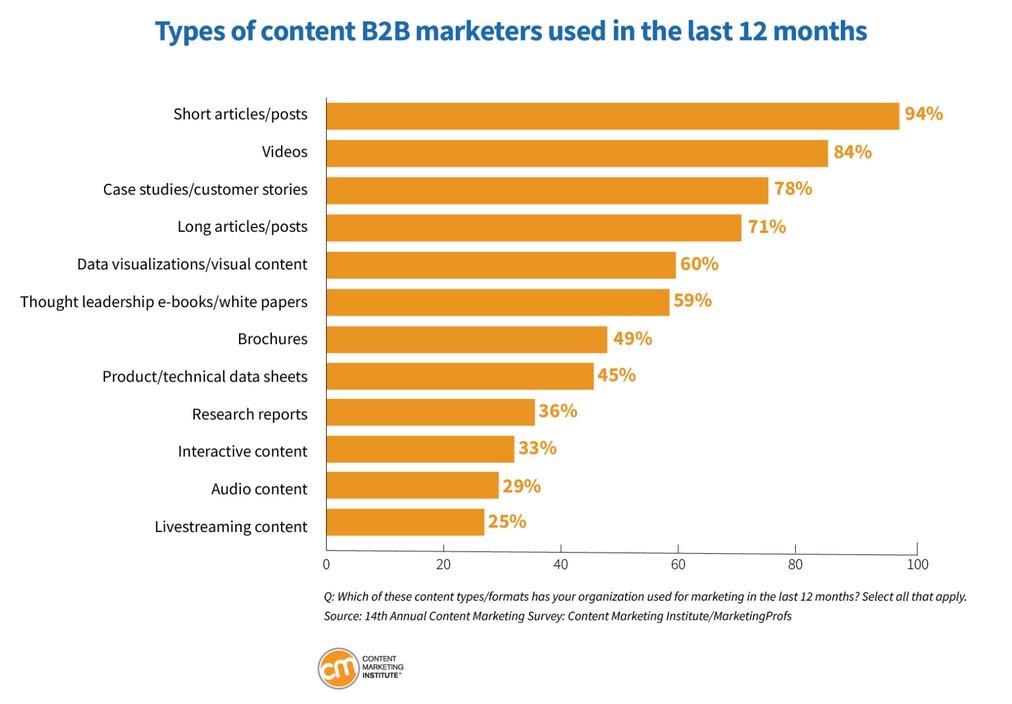
In today’s digital age, content marketing has become an essential strategy for companies seeking to attract, engage and retain their audience. But with digital channels saturated and customer expectations constantly evolving, it’s essential to constantly innovate in order to stand out from the crowd.
This is where marketing technology or “martech” comes in, offering tools and solutions to optimize every aspect of content marketing. From ideation and distribution to personalization and performance analysis, technology can truly unlock the potential of your content marketing.
The blog: THE fundamental technology of B2B content marketing
Although often considered a “traditional” digital marketing tool, the blog remains, in my opinion, THE fundamental and most powerful content marketing technology. Modern platforms offer advanced functionalities that make them a major asset for any content strategy, especially in the B2B world.
It may seem “old-fashioned” and a bit “boozy” to bring blogging to the forefront of your strateg. But all the studies keep confirming its importance. Despite those who predict its imminent death, especially with the arrival of AI. Recently, Jackie Dana, who works for namecheap.com, published a post on this very phenomenon, concluding as follows:
“Blogging has been around as long as the Web. And despite people periodically proclaiming blogging is dead, we see no reason blogs won’t continue to be a vital part of the Internet. AI will definitely change the landscape and how we generate blogs. But people will continue to express themselves online, and smart businesses will recognize the value of the human touch.”
In short, CMS like WordPress make it easy to create, edit and publish content, with extensive customization options. Most blogging platforms now integrate SEO tools, such as Yoast, to facilitate the optimization (greening) and referencing of your content.
Modern blogs also make it easy to integrate various types of media (videos, podcasts, infographics) to create rich, engaging content. Platform-integrated analytics tools provide valuable data on content performance and reader behavior.
Thanks to plug-ins and advanced functionalities, blogs can also offer a personalized experience to each visitor, increasing engagement. It can serve as the central core of your content strategy, feeding into your other communication channels and reinforcing your authority in your field of expertise.
Long posts vs. short posts: effective?
In our recent newsletter on LinkedIn, we rightly stressed the importance of this reinforcement through a good strategy of enlightened leadership or “Touught Leadership”.

What’s more, blogs offer unrivalled flexibility in terms of content format and length (the chart above). This allow you to publish both short, compelling articles, used by 91% of respondent. And long, in-depth posts, used by 71%. This versatility makes it an ideal tool for a variety of content marketing objectives, from customer education to lead generation
Artificial intelligence: at the service of content creation
One of the most significant advances in content marketing is the use of artificial intelligence (AI). This to generate and optimize your content. AI tools are capable of producing texts, article ideas and even complete drafts on any subject in a matter of seconds. This post, by the way, received a helping hand from Claude3. (Between Claude, we stick together… 😊)
Although this content generally requires human review, it provides a solid foundation for speeding up the creative process.
Beyond simple text generation, AI enables advanced content personalization thanks to machine learning. By analyzing user behavioral data, these systems can predict what types of content are likely to interest each audience segment.
This enables your marketers (if you have any”) to create tailored experiences, increasing engagement and conversion metrics, so important to many…
AI and content marketing: ethical and legal issues
The growing use of AI in content marketing raises important ethical and legal questions. Particularly concerning the use of existing content to train AI models. Is it acceptable for platforms to train their AI with your content?
This complex and highly topical question touches on issues of intellectual property, consent and fair remuneration. On the one hand, using vast corpora of text to train AIs enables the creation of better, more useful models. On the other hand, content creators or companies may legitimately worry about seeing the fruits of their labor (or their works) used without their explicit consent or without compensation.
Unclear legal implications
The legal implications are still unclear in many jurisdictions. Some argue that using content for AI training could be considered “fair use” in the USA, while others consider it a copyright infringement.
Faced with these issues, your content creators need to be vigilant and proactive. They may consider including specific clauses in their terms of use regarding the use of your content for AI training. Some opt for Creative Commons licenses that explicitly prohibit such use.
Companies developing AI, meanwhile, need to be transparent about their practices and ensure that they respect the rights of creators. Some are beginning to explore remuneration models for the use of content in AI training.
As technology evolves, it’s crucial that regulations and ethical practices keep pace to protect everyone’s interests. Debate on this issue will undoubtedly continue to shape the future of AI and content marketing in the years to come. Stay tuned for future posts.
Data analysis to understand your audience
Technology has revolutionized our ability to collect and analyze data on consumer behavior. Advanced analytics tools enable you to go far beyond basic metrics such as number of views or click-through rates. For example, Google Analytics 4 offers predictive analytics and machine learning capabilities to anticipate user behavior.
Platforms such as Mixpanel or Amplitude enable in-depth analysis of the customer journey, while tools such as Hotjar provide heat maps and session recordings to understand user behavior on a website. These tools offer in-depth insights into the complete user journey, from the first interaction with content to the final conversion.
This wealth of data enables extremely precise audience segmentation in B2B marketing. This in-depth understanding of the audience enables the creation of highly targeted and relevant content.
What’s more, predictive analysis technologies enable us to anticipate future trends and behaviors. By using complex algorithms to analyze intent, historical and current data, these tools can predict which types of content will perform best in the future. This ability to be proactive rather than reactive in content strategy gives a significant competitive advantage.
Automation: optimizing content planning and delivery
One of the major challenges of content marketing, apart from AI, is the need to regularly produce quality content across multiple channels. This is where automation plays an important role. Automated scheduling and publishing tools enable your marketing teams to schedule the distribution of their content in advance, ensuring a constant presence without the need for daily manual intervention.
Content curation, which involves selecting and sharing relevant content from other sources, can also be largely automated. Intelligent tools can scan the web for content matching specific criteria, filter it and suggest it for sharing, significantly reducing the time spent on this task. LinkedIn offers a similar feature for paid corporate accounts.
Workflow automation is another area where technology can free up valuable time. Advanced content management platforms can streamline creation, review and approval processes, reducing delays and improving collaboration between teams.
But here again, the corollary between automation and AI poses a problem, and it’s none other than Joshua Bengio who raises it in a recent interview in a French media outlet.
New technologies for innovative content
To stand out in a saturated digital landscape, you need to constantly explore new content formats. Emerging technologies offer innovative possibilities in this area.
Augmented reality (AR) and virtual reality (VR) pave the way for immersive, interactive content experiences. Whether enabling consumers to visualize products in their real environment through AR, or offering virtual tours through VR, these technologies make it possible to create memorable content that boosts audience engagement.
Interactive videos represent another promising avenue. By allowing viewers to make choices that influence the course of the video, this format creates a personalized, engaging experience. This approach can be particularly effective for tutorials, product presentations or brand storytelling.
Finally, the rise of podcasts and audio content offers new opportunities for reaching audiences on the move. Voice recognition and text-to-speech technologies make it possible to create and consume audio content in a more fluid and personalized way than ever before.
Note that these possibilities will be exploited first and foremost in B2C. Granted, the B2B market won’t be among the “Earlly Adopters“, but who knows? If you risk making a difference, as Ann Handley has long been advocating, you might just reap the rewards before your competitors do?
Conclusion: the future of content marketing in the technological age
It’s crucial to remember that technology is a means to an end, not an end in itself. The heart of content marketing remains the creation of value for the audience. Technology should be seen as an amplifier of creativity and efficiency, allowing you to focus on what really matters: telling compelling stories, providing solutions to your audience’s problems and building lasting relationships with your customers.
As new technologies emerge, the content marketing landscape will continue to evolve. Successful companies will be those that strategically embrace and integrate innovations, while remaining true to the fundamentals of quality, relevant and user-centric (Cx) content.
The future of content marketing is focused on creating personalized, engaging and measurable experiences through technology. Companies that embrace these trends and integrate them into their marketing strategies will be well placed to succeed in the technological age.
Want to find out more? Subscribe to our newsletter in French or contact our team of seasoned experts directly.




